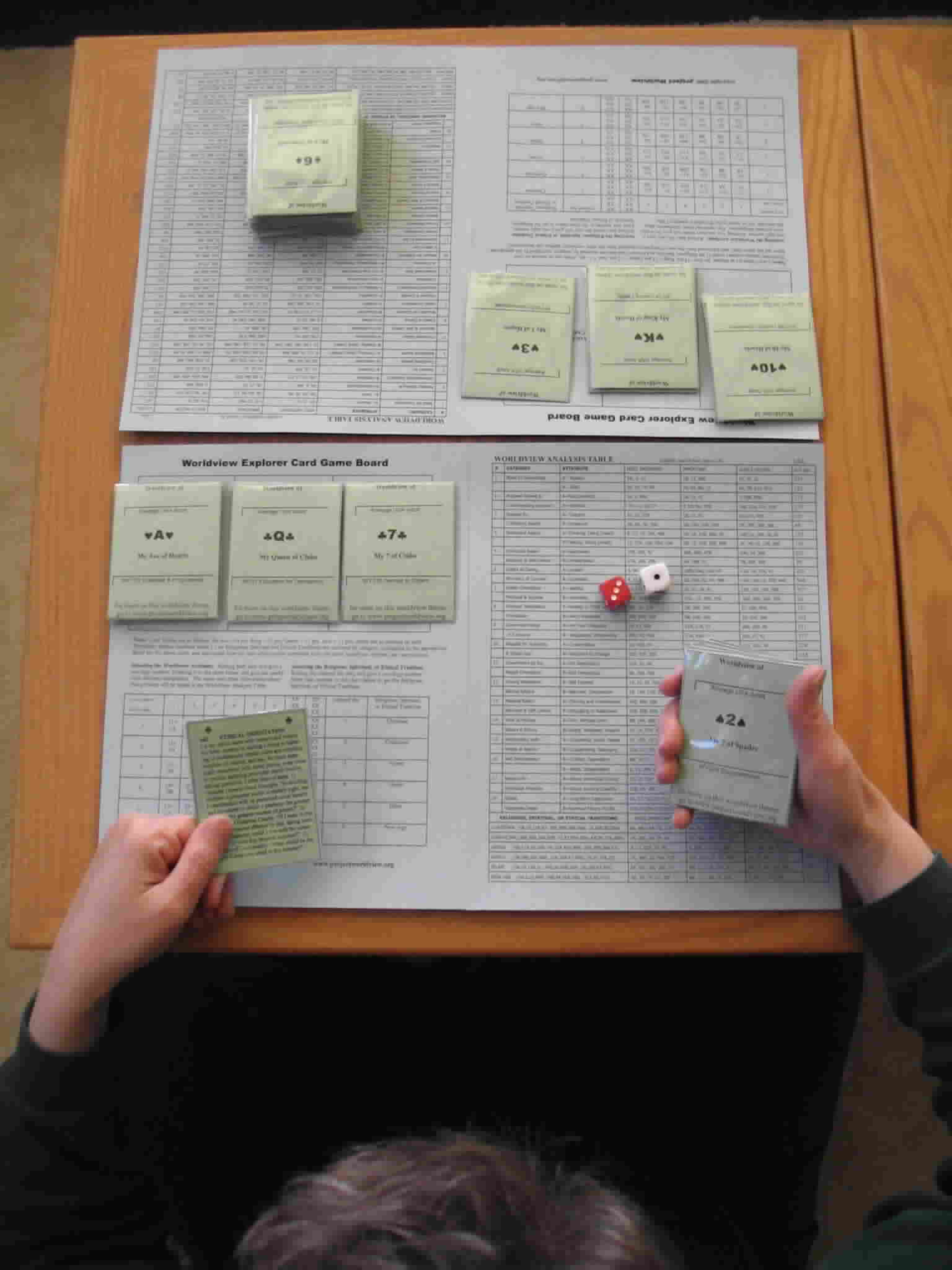project WORLDVIEW copyright 2015 Home
about The Worldview Explorer Card Game
This uses the older version 2.0 and 3.0 theme structure, pictured in the Map of the Reality Marketplace you'll find here.
The Worldview Explorer Game
This is an educational, fun card game for from one to four players. Making use of the customized worldview theme cards you create,
this is a game for learning more about
your own
worldview and the worldviews of others.
Create Your Own
Customized Worldview Theme Cards
The
"Custom Cards" program is something that is to be used after
completing
the “Your Worldview to Deck of Cards Translation”
sheet that you'll print out. This program will facilitate creating a deck
of playing cards customized to embody your own worldview. Fronts of cards
will feature the value and suit of the card (e.g. Ace of Spades, etc), the name
of the associated worldview theme, and your name.
Backs of cards will feature
the complete text of the associated worldview theme description.
You'll
print out this deck of cards using your printer and card stock you
provide.
To play the Worldview Explorer Game you need to both provide additional inexpensive materials and do some work making something. With respect to the former, you'll need blue card stock, plastic sheet protectors, a medium size three ring binder, clear invisible plastic tape, and dice. As for making something, after making acomputer assisted effort to build, refine, understand, and assess your worldview, you will create a customized deck of playing cards that embodies that assessment of your worldview. Our "Custom Cards" computer program, card stock, your printer, scissors, tape, etc. will be employed here.
Frequently Asked Questions
FAQ: Why focus on translating a person's worldview onto a deck of playing cards?
Worldviews are unique, extraordinarily complicated, and thus difficult to characterize and get a handle on. While obviously providing only a first (an admittedly very simplified) approximation, use of worldview theme cards provides a way of doing this. There are several reasons for choosing playing cards--most notably they are in widespread use, their size will limit the information contained to a manageable amount, and they are associated with confrontation as in playing a game. In the "game of life" you often confront people. The outcome of more serious and involved confrontations or interactions--whether a dispute is resolved, whether you get in a fight, whether you are able to exchange valuable or instructive information, whether you grow from the interaction, whether you have a happy marriage, etc--can often critically depend on the worldviews of the participants and how well they understand and accept those worldviews. It can be likened to sitting down with a person or persons to play cards: the better idea you have of the cards both you and the other people are holding, the better off you'll be in steering the game's outcome to your liking!
FAQ: After I use the Project Worldview webiste starting here to assess my worldview in terms of the eighty worldview themes (on fifty-two theme cards or frames) it provides, do I have to translate it or relate it to a deck of cards?
If you want to play the Worldview Explorer Card Game, yes!
FAQ: I'm trying to visualize playing the Worldview Explorer Card Game. Can you show me a picture of a game in progress?

FAQ: What is the objective of The Worldview Explorer Game?
The game provides a structure for exploring, discussing and better understanding one's own worldview and the worldviews of others. The objective is "To learn more about one's own worldview and the worldviews of others" (either those playing the game or, if one plays alone, the worldview of a typical American adult). Informally the game provides an alternate (and hopefully more fun!) way of doing an analysis of worldviews based on various attributes (36 of them; the first six succinctly labeled are: Reason, Faith, Reductionistic, Wholistic, Tolerant, Intolerant ) and religious/spiritual/ethical traditions (six: Christian, Confucian, Green, Hindu, Islam, and New Age)
How is The Worldview Explorer Game played?
Basically each player must first spend some time articulating one's worldview and creating a customized deck of worldview playing cards (using other tools/programs on the Project Worldview website and in The Worldview Kit). The game is then played in rounds, where players alternate choosing which attribute or tradition that round will be based on from possibilities provided by rolling dice. The player whose turn it is will pick the attribute or tradition that he or she believes is most consistent with his or her worldview and least consistent with the (imagined) worldviews of the others playing. Based on a Worldview Analysis Table provided on the game board, each player's worldview is scored for that round's attribute or tradition choice. After a predetermined number of rounds (to be chosen by players based on how long of a game is desired--this might be twelve if three players are playing) points are totaled. The player with the most points wins.
While seemingly it is competitive based on there is winner with the most points, it is also co-operative and communal. To score well requires some knowledge and insight into the worldviews of the other players, thus there is an element of understanding/empathising with the other players. At the end of each round each group can pause and discuss individual worldviews in terms of the round's attribute or tradition. More mature players realize that winning based on the number of points isn't that important (and that there is an element of luck involved in who wins), but rather it's the learning and understanding obtained from playing and interacting with others that is to be valued.
The Project Worldview website provides files and instructions for printing out and creating: 11" x 17" WV Explorer Card Game Boards, score sheets, and instructions. Details are here.
project WORLDVIEW Home